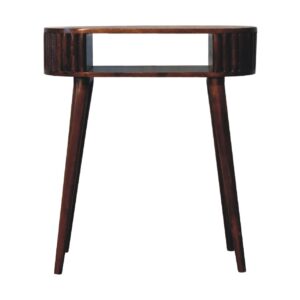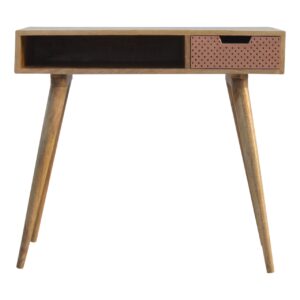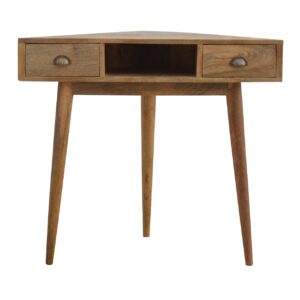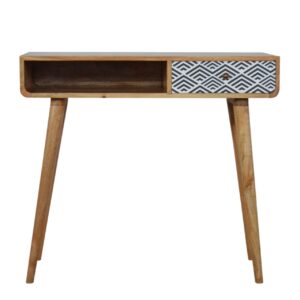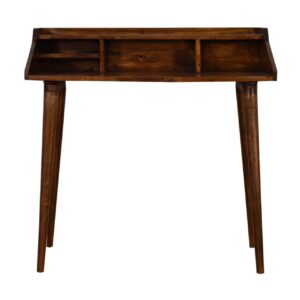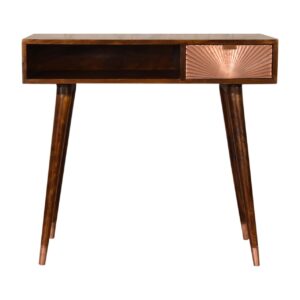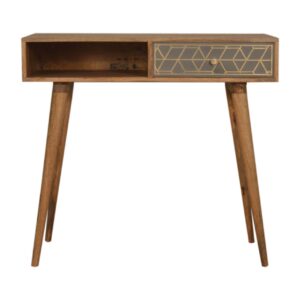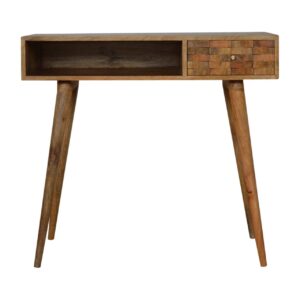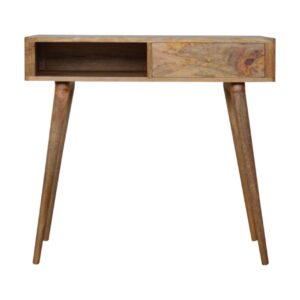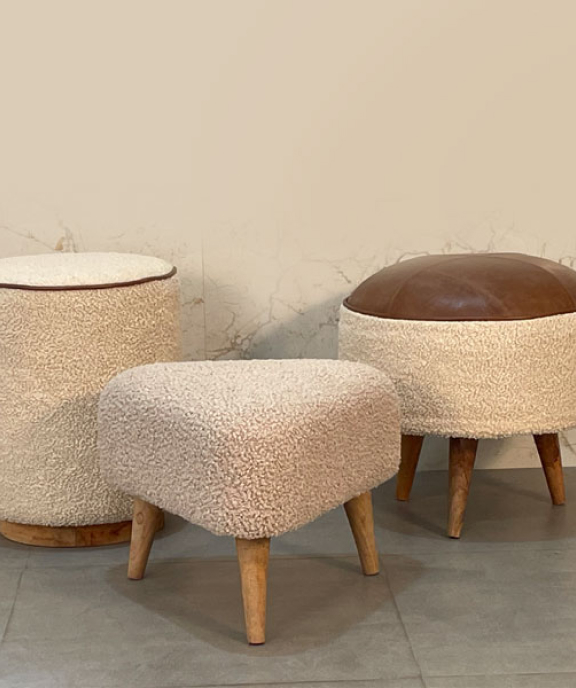Selecting the perfect writing desk is more than just picking out a piece of furniture; it’s about finding a partner in your productivity endeavors.
A key factor to consider is the desk’s size and how it will integrate into your existing space. Will there be enough room for movement and other necessary items? Think about the style that reflects your personality and supports your work habits.
You must also weigh the durability of the material since you want a desk that can withstand daily use and last for years. Comfort is non-negotiable; an ergonomically designed desk can prevent strain and support your posture during those long work sessions.
Additionally, the availability of storage and organizational components is vital to maintain a clutter-free and efficient work area. These considerations lay the groundwork for a decision that will impact your daily work life significantly.
Assessing Space Requirements
Selecting the Right Writing Desk for Your Space
When picking out a writing desk, it’s practical to consider the dimensions of the room to ensure the desk will fit without hindering your ability to move around. You want a desk that provides enough space but also supports a natural flow of movement.
Comfort is key—you should be able to extend your legs, rotate in your chair, and reach items effortlessly. Take measurements of the room, mindful of doors, windows, and existing furniture. Aim for a desk that offers sufficient surface area for your work while preserving the balance of the space.
A desk that’s overly large can dominate a room, and one too small may fall short of your requirements. It’s not just about functionality—comfort and design matter significantly. A harmonious balance between size, function, and style is the goal.
Selecting Desk Style
When selecting a desk, the key is to find one that serves your work needs while also fitting in with your aesthetic preferences. A desk that’s too large can dominate a space, but you need ample surface area to handle your tasks comfortably. The ideal desk marries aesthetics with practicality, providing a workspace that’s both visually pleasing and conducive to productivity.
Ergonomic considerations are paramount; your desk should promote a healthy posture, allowing for the free movement of legs and arms. It should be at the right height to prevent strain on your shoulders and wrists.
Your choice of desk can also be an expression of your personal style. For those with a penchant for modernity, a sleek, minimalist design might be the perfect match. If you prefer a cozy, inviting atmosphere, a traditional wooden desk could be the answer. The goal is to select a desk that not only meets your functional needs but also makes your work area a space you enjoy being in.
In terms of specifics, an adjustable standing desk could be a wise choice for someone who values the flexibility to alternate between sitting and standing. For those who lean towards classic styles, an oak roll-top desk might be a charming addition that provides both style and functional organization.
Material and Durability
When selecting a writing desk, evaluating the material and its ability to endure daily use is key to ensuring it lasts and serves its purpose efficiently.
Desks crafted from solid wood, such as oak or walnut, aren’t only visually impressive but also offer considerable strength, although they tend to be more substantial in weight and come with a higher cost.
For those who need a cost-effective option without sacrificing too much on durability, engineered woods or MDF with a veneer finish might be the right choice, but be aware that these materials may show signs of wear after extensive use.
Metal frames paired with glass or wooden tops are a stylish choice that brings a contemporary aesthetic and renowned sturdiness to a workspace.
Additionally, laminate-topped desks are a practical and economical choice with their ability to resist scratches and stains, suited for those who use their desk heavily.
It’s important to select a desk that’s not only pleasing to the eye but can also meet the demands of everyday tasks and usage.
Ergonomic Design Considerations
The design and functionality of a writing desk play pivotal roles in our day-to-day comfort and work efficiency. When selecting a desk, it’s vital to find one that supports a natural sitting position, with your feet planted on the floor and your forearms parallel to the ground while typing. Ideally, the height of the desk should match the level of your elbows when you’re seated, which helps prevent muscle strain.
It’s also important to have enough space under the desk for comfortable leg movement, and the desktop itself should be spacious enough to handle your tasks without becoming overcrowded.
An adjustable desk can significantly improve your work environment, allowing for a customized fit to your body’s proportions and encouraging you to change your position throughout the day, which is beneficial for your health. Additionally, positioning your monitor at eye level is critical to avoid neck discomfort.
Paying attention to these ergonomic considerations isn’t just about comfort—it’s about preventing long-term health issues and maintaining productivity over time.
Storage and Organization Features
Selecting the perfect writing desk requires careful attention to its storage and organizational features to ensure our work area remains tidy and conducive to productivity. A desk that successfully combines practicality with aesthetic appeal can significantly enhance the quality and enjoyment of our work environment.
| Feature | Benefit | Aesthetic Value |
|---|---|---|
| Drawers | Keep important papers and tools secure | Creates a sleek, uncluttered look |
| Cubbies | Allow for quick retrieval of commonly used items | Introduces a personalized flair |
| Cable Management | Eliminates wire tangles | Ensures a neat, contemporary vibe |
Choosing a desk with enough drawers helps prevent a messy desktop, cubbies provide convenient access to necessary items, and a good cable management system keeps those distracting cables out of sight. The decision isn’t just about picking out furniture; it’s about designing a space that fosters innovative thinking and productivity, all while considering comfort, functionality, and visual harmony.
When assessing desks, it’s not only the immediate visual or storage benefits that matter. The right desk can have a profound impact on our work habits, concentration, and even well-being. It’s therefore wise to invest time in selecting a piece that supports our workflow and complements the rest of our space.


